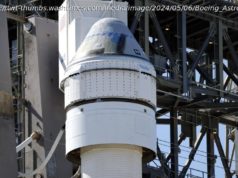About 100 members of Houston’s Korean community – many of whom endured the horrors of war in the 1950s – staged a demonstration on Wednesday as the Winter Olympics are poised to begin in their home country. Group members waved the South Korean flag, which will be sidelined in favor of a Korean Unity pendant at this week’s opening ceremony, and burned North Korean leader Kim Jong-Un in effigy
About 100 members of Houston’s Korean community – many of whom endured the horrors of war in the 1950s – staged a demonstration on Wednesday as the Winter Olympics are poised to begin in their home country.
Group members waved the South Korean flag, which will be sidelined in favor of a Korean Unity pendant at this week’s opening ceremony, and burned North Korean leader Kim Jong-Un in effigy after singing the South Korean anthem.
Instead of simply stirring national pride, the international games are reminding local Koreans of the continuing military threat from the north.
“North Korea is our enemy,” said Helen Chang, one of the rally speakers said after the demonstration. “This is most ridiculous…. Lots of people in Korea and lots of people in America – Korean Americans – are upset.”
She said the protest was staged ahead of the games to offset communist North Korea “exhibiting their militant power” on a world stage. She called Kim an “idiot” who is “trying to threaten the whole world’s peace.”
The countries are fielding a joint women’s hockey team and the athletes are scheduled to walk into the opening ceremony serenaded by Korean folks songs.
“This is our Olympics. We should be proud of the [South] Korean flag and we should sing the [South] Korean anthem,” said Chang, a former president of the Korean American Association of Houston.
Attendees and other speakers also were unhappy with the new South Korean president. They appealed to President Donald Trump and other world leaders not to be fooled by the show of unity in sportsmanship. Vice President Mike Pence said in Japan on Wednesday that the U. S. was planning to announce the “toughest and most aggressive” economic sanctions against North Korea soon.
The nearly hour-long morning protest in Houston was staged in Haden Park on the city’s west side near Memorial City Mall. The area has become the city’s Korea Town – a cluster of commerce, culture and churches centered in the Spring Branch area.
Rally speakers addressed the crowd in Korean alongside a banner with Kim’s face and a full-body cardboard likeness. After emphatic words blared through a bullhorn as the chilly wind blew embers from a charcoal fire, rally leaders ripped the head off the effigy and threw the pieces in the flames. Others had pictures of Kim on letter-size papers they tore up and tossed into the fire.
There are almost 2 million people of Korean heritage who live in the United States, according to the U. S. Census Bureau. One in 20, about 90,000, are Texans.
David Shin, who leads the Korean American Association of Houston, estimates that at least 30,000 people of Korean descent live in the local area.
He did not attend the rally, but noted that North Korean spies were responsible for a South Korean plane explosion ahead of the 1988 Seoul Olympics, the nation’s first time hosting the games.
“In the Seoul Olympics, they had scuba divers inside the river looking for North Korean bombs. This time around, they’re invited to the Olympics,” he said, shaking his head. “So, even though we’re at the verge of war this time, they’re over there holding hands.”
But the unity of the Korean athletes, aside from their governments or politics, was “a good thing, but it’s also a distracting thing,” Shin said.
The real estate investor hopes the world looks beyond political rhetoric and posturing to the rapid development and prosperity of South Korea.
So does Mark Shim, a Houston businessman who stood by the flames at Wednesday’s rally with a fire extinguisher. He leads the Korean American Society of Houston, a group of young professionals that hosts the annual Korean Festival Houston known as K Fest.
In square miles, Texas is about seven times the size of South Korea. The lower half of the Korean Peninsula has sparse natural resources, but was invigorated by innovation, industry and investment in the decades after the Korean War.
Most Americans and the world, Shim said, developed a popular perspective on South Korea through the lens of the MASH television series of the 1970s and early 1980s that depicted a U. S. Army surgical unit during the Korean War.
“The 1960s and ’70s really lifted Korea from being a poor country to a really modern and industrialized country, which we saw in 1988 with the Summer Olympics. That’s when people started to look at us. It was like a big pop,” Shim said. “Before ’88, the perception of Korea was associated with the MASH TV program so everyone was poor and hungry, but they never realized how Korea was being modernized.”
Today, the Hyundai Kia Automotive Group is the nation’s largest automaker and Samsung, also based in South Korea, is a world leader in consumer electronics.
“It was the government that subsidized and supported the growth of these companies that are now international,” Shim said. “It is amazing for the short time span and for such a small piece of land.”
South Korea’s consular representative in Houston, Hyung Gil Kim, said that the games are designed to promote peace and have invigorated talks between the Korean nations. The two countries separated during World War II and the Korean War, which ended with an armistice in 1953.
“Our goal is to make the Pyeong Chang Olympics an ‘Olympics of Peace.’ Despite heightened tensions, the recent reopening of inter-Korean dialogues will encourage [a] thaw in relations between the two Koreas,” the consul general of the Republic of Korea in Houston said in a statement. “South
and North Korea started their first official high-level talks in two years and, in a symbolic breakthrough, [the] two Koreas agreed to form their first joint Olympic team and have their athletes march together under one unified flag for the first time in 11 years during the opening ceremony.






